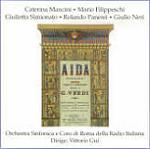There is something wonderfully blood-and-thunder about this performance, recorded on Oct 12, 1951. Vittorio Gui leads the type of performance you’d be thrilled with in the opera house–grand, big, exciting–and the occasional lack of unity or polish in the choral and orchestral forces is not a bother. The singing is large as well, with Caterina Mancini, a somewhat provincial soprano of the period (if you compare her with her contemporaries Tebaldi, Callas, Cerquetti), offering a full-voiced Aida with little subtlety but plenty of exciting tone, and Giulietta Simionato a simply glorious Amneris–biting and regal–with the voice impressive at all registers.
Mario Filippeschi’s Radames is what we’ve come to expect of this tenor–all the notes, mostly belted, always reliable in both good and bad ways. Rolando Panerai sounds like a very young Amonasro, but his passion and impeccable diction are always welcome. Bass Giulio Neri, with his voice as big as the Grand Canyon, sings Ramfis note-for-note, and the rest of the cast is acceptable. Of course, this isn’t a first or only Aida in anyone’s collection, but it’s not at all bad. Sound is boxy but good enough.
































